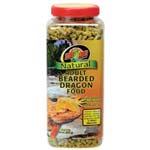Commercially-prepared diets for reptiles have become quite popular lately, but we do not have long-term research concerning the value of most. However, when used with care, some can simplify the feeding of certain species while contributing to their health. Reptomin, for example, is used in many major zoos, and I relied upon it heavily during my years working at the Bronx Zoo’s Reptile House. Success with commercial diets is a matter of choosing one produced by a well-respected company, and pairing it with natural food items in the proper proportions. Today I’ll review one such product now marketed by a leader in pet reptile nutrition, Zoo Med’s Bearded Dragon Food (Adult and Juvenile).
 The Evolution of Prepared Diets
The Evolution of Prepared Diets
The Inland Bearded Dragon, Pagona vitticeps, is likely the world’s most popular lizard pet. Yet this fascinating lizard was virtually unknown in the USA, even in zoos, not long ago. Indeed, many lizard enthusiasts are surprised to learn that all pet trade animals seem to have originated from a small group smuggled out of Australia to Germany in the early 1980’s (please see this article for further information).
Due to the great interest in keeping and breeding this species, hobbyists and pet supply companies have researched its captive husbandry quite thoroughly. As a result, we now know have a very good understanding of the Bearded Dragon’s dietary needs, health care and reproduction (please see articles linked below). An interesting offshoot of this work has been the formulation of several prepared Bearded Dragon diets. Because of the care and research that Zoo Med puts into all of its products, and the company’s outstanding reputation among professional zookeepers and private hobbyists alike, I favor the Zoo Med’s formula over others. Read More »
 That Reptile Blog – Reptile, Amphibian and Exotic Pet Care and Information
That Reptile Blog – Reptile, Amphibian and Exotic Pet Care and Information
